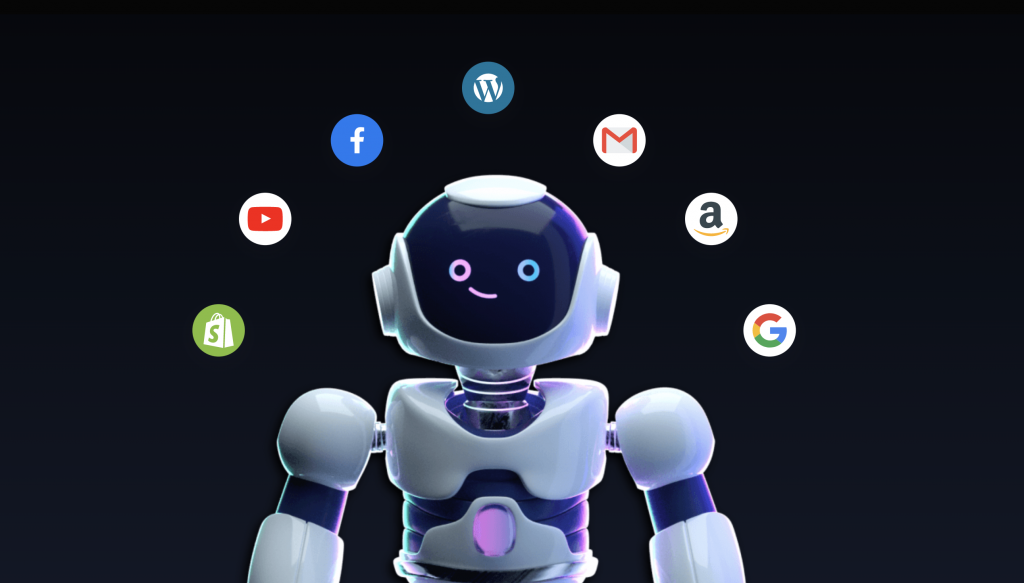
8 Powerful Ways You Can Use AI In Marketing
By: Growth Kolony
Using AI in marketing gives your business an unfair advantage.
So today we’re going to look into some of the most effective ways businesses are leveraging the power of AI in their marketing.
Let’s get right into it.
Chatbots

There’s a lot of buzz around chatbots, they have become a popular topic for good reason.
Chatbots allow businesses to communicate with a customer 24/7 in a fluid way, even when human representatives are unavailable.
With 80% of users likely to start a conversation with a brand on Facebook messenger, having a chatbot available to customers gives businesses a leg up over competitors without chatbots.
They prevent users from bouncing off the landing page and navigating elsewhere.
A number of companies have found success using chatbots and thanks to artificial intelligence (AI) and natural language processing (NLP), chatbots are able to solve customer problems without having to transfer customers to a human representative.
Content And Product Recommendations
In today’s growth marketing landscape relevancy is king.
This is why digital marketing outperforms traditional marketing. Businesses can show ads and products — in all their forms — to a relevant audience at the right time throughout the customer journey.
With AI-powered clustering, marketers can improve on relevancy and suggestive selling.
Here’s where brands use customer behavior data to anticipate future customer behaviors.
Amazon is a perfect example of how a business leverages AI-powered clustering.
They use AI-powered clustering to show customers relevant products to their customers.
Not only that, but Amazon also shows complementary products that other customers have bought with the product that you are interested in buying.
The same goes for publishers of content.
Publishers can use an AI-powered tool like IDIO, to read user behavior and suggest relevant content to users in the future throughout their customer journey.
Predictive Analysis

Predictive analysis is the term that describes the method of using data that you presently have to predict future trends.
AI can be used to analyze data sets — in this particular case-specific dates — in order to predict purchasing trends that will come up in the future.
This is a complex task but with the help of artificial intelligence, businesses can automate the process and make decisions much quicker and with more accuracy.
Predictive analysis is normally applied in e-commerce to find a pattern in the buying habits of a customer and it can then be used to determine when the customer is going to repeat a purchase; improving intuitive customer service.
For instance, imagine that you own an online store that sells supplements for bodybuilders.
With AI you can find out how long it will take for the customer to consume the supplement and when more will be needed.
AI can be used to send an email to the customer just before the product has been consumed, reminding the customer to order more before it runs out.
Product Pricing
You can leverage AI to your advantage by letting it help you find out demand-based pricing.
What is demand-based pricing?
Demand-based pricing is pricing according to the amount of money people are willing to pay for your product or service, which can also change with time.
Let’s use the hotel industry as an example.
If you live in a city like Paris or Rome, you can expect that more people will be coming to your city during peak tourist season.
During the peak tourist season, there is high demand for hotels and people are willing to pay more.
If it is the offseason then demand is going to be lower and people are not going to be willing to pay as much as they would during peak season.
AI can be used to analyze these pricing trends and can give you dynamic pricing for your product or service; helping you maximize quarterly earnings.
Social Listening

If you want to improve and grow into different regions, you need to know what people think and say about your business.
This is where AI in social media marketing comes into play.
Businesses today are using tools like Meltwater to effectively streamline their social media listening.
Social media listening or monitoring is when brands track what users say about them on social media.
With the web being a seemingly infinite space, AI can be used to track brand mentions, conversations, and overall feedback that customers provide in real-time on one easy-to-access dashboard.
Search Engines
We take search engines for granted in 2019 but the truth is that behind the scenes a lot is going on and it all happens in a couple of seconds.
Google was the first to implement AI in search but since then other businesses have followed suit and used that model for their own site search engines.
One example that you may be familiar with is Amazon.
It is because of AI that both Google and Amazon are able to give users accurate search results when users are uncertain about what they search for.
It’s also worth noting that AI tools like Siri, Cortana and Google Assistant use search engine data to retrieve and refer answers to user queries.
This means businesses today can optimize for virtual assistants and voice search to improve overall traffic and sales.
Copywriting

While AI cannot write a political opinion piece, it is powerful enough to write unique subject headlines for email, product descriptions, and more.
A popular AI copywriting tool is Jasper.
With Jasper businesses can automate the writing process and avoid some of the aches and pains that come with writing copy.
It’s not perfect but it does help with the content marketing process.
Web Design
10 years ago businesses would need a designer in order to create a professional-looking website — much has changed since then.
There are AI-powered online tools and site builders like The Grid that can help anyone with a startup idea make a site without learning how to code.
All business owners have to do is create the interface of the website — just like setting up building blocks — and then from there have AI write the code for them.
All the coding happens in the background without you knowing.
Of course, there are tradeoffs that come with every website builder, but, it’ll get something up if you need a website as soon as possible.
Summary
AI has come a long way since Alan Turing first tested a computer’s ability to behave intelligently.
Today we see AI being integrated across a wide range of departments, including marketing.
With AI, businesses can improve customer interactions, personalize the customer journey and experience, data mine faster, provide real-time customer assistance, predict outcomes and even create content.
If you have any questions about AI marketing or need help taking your online business to the next level feel free to call us at 1.888.593.4159 or chat with us in real-time on Twitter.

